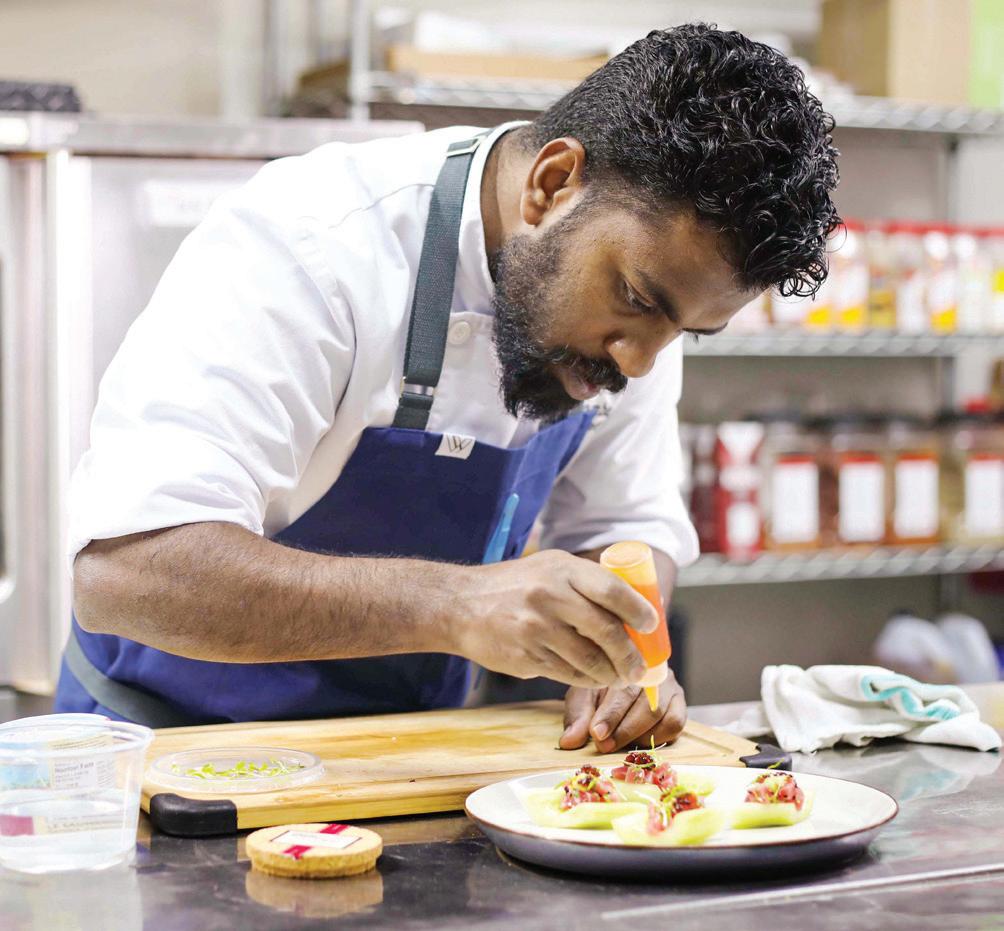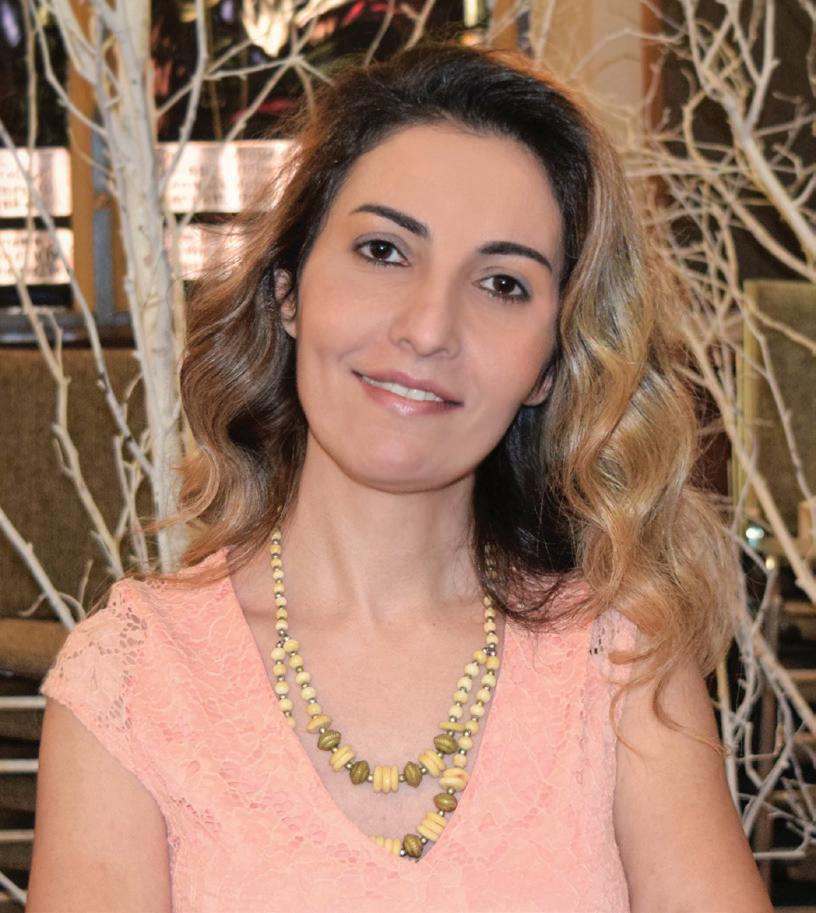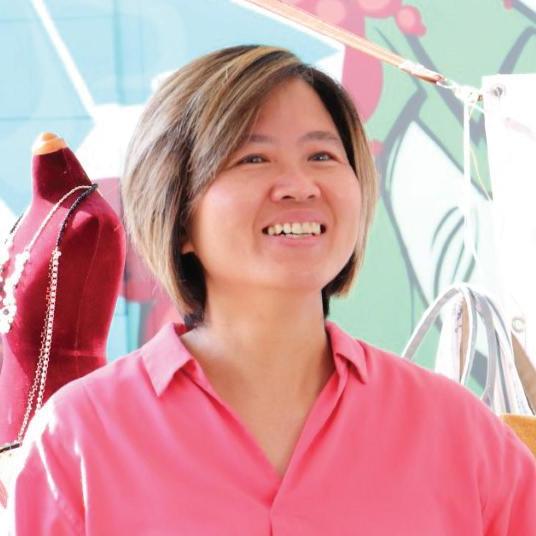
13 minute read
COVER STORY
EMERGING FROM COVID-19
Canadian immigrants share their experiences during these pandemic times
By Baisakhi Roy
As the world continues to learn to deal with the COVID-19 pandemic, the newcomer and immigrant communities in Canada are facing unique challenges of their own and finding ways to cope.
While more recent arrivals to Canada are learning to deal with new jobs, paying rent, income insecurity and building a social network in this environment of social distancing, some more established immigrants are working hard to keep their businesses going. The challenges created by the pandemic have led to new government assistance programs, a focus on mental health and innovative offerings from settlement agencies serving immigrants.
Working through a lockdown
Like many parents, Ukranian-born Oksana Kandiller has found it hard to respond to her three-year-old asking when she’d be able to meet her friends at daycare again. Kandiller, her husband and daughter moved to Canada in October 2019 and were just about settling down into their new lives when the lockdown happened.
“The hardest part of this entire experience so far has been that my husband and I haven’t been able to give our child the attention she craves and deserves at this age,” says Kandiller. With daycares shut, the couple is struggling to keep up with office work, studies and household chores, not to mention keeping their child in good spirits. “She’s a very sociable kid and fits in very well at her daycare. She misses her friends and when she asks us tearfully when all this will end, we have no answers for her. It’s hard,” she says.
Kandiller recently found a job as a finance manager with a Toronto non-profit, Aangen, while her husband started an online course in logistics and supply chain management at Seneca College. Finding the job through the Chance for Change Program at Aangen, a program which supports marginalized members of the community by providing them with job opportunities, was a godsend for her.
Kandiller acknowledges that she is luckier than most in finding employment in the field of her choice and that both she and her husband, Yigit, have had the benefit of government support.
COVID-19 has had a devastating impact on employment in Canada, with over one million jobs lost in March alone. In response, in April, the federal government created the Canada Emergency Response Benefit (CERB), providing $2,000 every four weeks to those have stopped working for reasons related to COVID-19. If the situation continues, those who are eligible can re-apply for CERB every four weeks, for up to a total of 24 weeks till October 2020. Yigit is also able to access the Canada Emergency Student Benefit (CESB), also launched in April, which provides financial support to post-secondary students and recent post-secondary and high school

“The CESB support that my husband secured was especially useful. He got it at the end of May and it was the first month when we were able to pay our bills without dipping into our savings,” says Kandiller. The family is hoping that schools will reopen safely for the sake of their daughter who is excited for junior kindergarten in September and that Yigit will land a stable, well-paying job when his course ends in August.
Pivoting in a pandemic
Stunning photos of aesthetically-plated cuisine make Sri Lankanborn chef Muralitharan Thamba’s Instagram account a delight. Based in Ajax, Ontario, Thamba has been running a successful catering business, Brindleberry, for the last few years. However, the pandemic has forced him to cancel more than 20 events including weddings and receptions, resulting in losses that amounted to hundreds of dollars.
“For the past four years we had made a mark when it came to major events…. This pandemic has been tricky and problematic for not just me but for everyone who is trying to operate a small business, regardless of the industry. But, despite all the obstacles the pandemic brought on, this crisis gave my team and me an opportunity to explore avenues that we hadn’t considered in the past.”
Thamba and his team had to pivot quickly to save the business that he’s set up with so much love and passion.
The catering service started providing their customers with delivery and pick-up options for pre-orders. It also benefited from the timely relief provided by the Canada Emergency Commercial Rent Assistance program (CECRA) – a benefit for small businesses in Ontario that will help those impacted by the pandemic keep afloat until the economy reopens fully. Under this program, Thamba has to pay only 25 per cent of the rent for April to July.
His team has not only started on the road to recovery but is also giving back to the community. “We at Brindleberry, have partnered up with various local organizations in the community and have been assisting with preparing over 1,000 meals for frontline workers to date. This gives me and my team the satisfaction of being able to help out in a time of need for those that risk everything to help the country get back to where it once was,” he says.
Staying social virtually
For most immigrants and newcomers in Canada, community centres, libraries, and recreation and cultural centres are a lifeline that connects them to the community at large. These venues serve as a safe space for sharing their experiences, meeting mentors, participating in social and cultural programs and getting familiar with their neighbourhood.
With the country going into lockdown mode in March, immigrants experienced an acute sense of loss and disconnection. Though some libraries in Toronto and the GTA have now started to offer online versions of their in-person programs, services are not back up to a 100 per cent.
Settlement agencies have taken their services online to keep the social connection alive. Muralitharan Thamba

not familiar with English and now with this pandemic, this sense of isolation and loneliness is heightened,” says Hui Geng, manager of the Canada Connects program at North York Community House (NYCH), an agency supporting newcomers with their settlement in many ways and helping them feel at home in Canada.
The organization’s social mentorship program has been connecting established volunteers with newcomers so that they may practise their English-speaking skills through Zoom meetings. The fact that these seasoned volunteers are immigrants themselves makes it easier for newcomers to connect beyond just learning; they are able to open up about their feelings.
A recent Statistics Canada report revealed that immigrants were more likely than Canadian-born individuals to have higher levels of concern about preserving social ties (44 per cent vs. 30 per cent) and about the ability to support one another during and after the pandemic.
It’s not surprising then that a popular program at NYCH is the virtual conversation circle.
In April, COVID, and the fears and concerns surrounding it, was a hot topic.
However, it’s not all serious conversations. Fridays are reserved for virtual tours to popular Canadian destinations or virtual movie nights, giving participants a great opportunity to break the cycle of isolation.
Kandiller, who does not have extended family in Canada, understands this need to seek out community during this time.
“We as a family have started valuing social connections so much right now, since we’ve not had it for almost three months!” she says. “Now we have ventured out gradually, made some friends in the neighbourhood, and our kids are playing together—socially distanced, but it’s something.
“On Canada Day, we went to Niagara Falls, our first trip since we came to Canada,” she adds. “It was a dream come true. Once this is over, I will chase every opportunity to go out!”.
Voices from the community
By Ramya Ramanathan
As they say, every crisis brings with it a new opportunity to adapt and grow. Here are some diverse voices from the community sharing their own unique stories in these pandemic times.
Ghaidaa Arbash was originally a pediatrician in her native Syria. That expert knowledge of both health and children is helping her to ensure the families she works with, through her job at WoodGreen Community Services, are well supported during the COVID-19 pandemic.
Arbash and her husband moved to Canada in May 2012, when her first daughter was three years old and she was five months pregnant with her second daughter. “We chose Canada because we wanted to raise our daughters in a safe, developed and supportive community,” she says.
Arbash is committed to helping others who have made Canada their home. She usually supports refugee families in need, from in-person workshops to providing support with their citizenship tests to helping them navigate the often-confusing government and financial systems in a new country.
GHAIDAA ARBASH, family support worker, WoodGreen Community Services

The pandemic has changed all that – no longer able to meet her clients in person at the WoodGreen office or local libraries, she is doing everything she can to ensure they continue to be supported through this challenging time.
Arbash has pivoted to helping virtually – walking clients step-bystep on how to apply for government benefits, translating complex COVID-19 health information into Arabic, ensuring families can

COVER STORY
get their kids connected to online learning and organizing online workshops and conference calls about how to access resources and supports.
The situation has been challenging to her clients. “On top of the personal challenges that everybody has, like adapting to the online learning and quarantine, my clients lost their connections with the governmental support channels and most of them were in fear and stress because of the environment of uncertainty. In addition, some of them lost their jobs.”
When she’s not connecting with clients online, she’s ensuring newcomer seniors and others get the groceries and vital supplies they need while in isolation. As an immigrant herself, Arbash can relate to her clients’ struggles and is going the extra mile to ensure they all have what they need to weather this crisis.
Arbash sees opportunities for learning as we emerge from these times of COVID both at the community and professional level.
“On the community level, I think we proved that Canadians are very supportive of each other, very responsible, and caring…at the professional level, I think we need to better integrate with online support programs. Web-based meetings may sometimes have a better chance of attendance and more options of presentation.”
What makes her work meaningful to her is being able to help vulnerable people through difficult times.
“It is an amazing feeling when you can do something for people who are really confused and support them with all struggles that they have as newcomers,” she says.
FLORENCE KAO, Employment Specialist, DIVERSEcity Community Resources Society

Florence Kao says she’s someone who never gives up. “I always look for solutions, instead of problems,” says Florence, who works with B.C.-based immigrant-serving agency, DIVERSEcity Community Resources Society.
Kao has found a way to use both her professional experience and her sewing skills to find solutions to the problems caused by COVID-19.
Kao is working with a group of immigrant women in B.C., sewing cloth facemasks to help in the face of the COVID-19 pandemic. These entrepreneurial seamstresses are members of a sewing business collective called Sewmates Craft, a part of the Intercultural Women’s Maker Society.
The Cloth Facemask Initiative came together within days after the women had their first virtual team meeting on March 25, soon after the start of the pandemic in Canada. Research was done, sewing machines came out, patterns were created and the women started sewing masks — each from their individual homes.
As of mid-July, the sewing collective has already made and delivered more than 2,700 cloth facemasks to vulnerable communities and those in need who wouldn’t have access to medical masks. The plan is now to call for donations so they can get the masks to designated care home facilities and/or homeless shelters.
“Sewmates Craft members are genuinely appreciative of being able to offer something in the COVID situation. By helping the community, the group also implemented the whole business operation process in this initiative, including product development, promotion/marketing, production, delivery/logistics and accounting practices. It’s a precious experience for a new business collective. The sales from individual orders and designated donations are able to cover the cost of fabrics, supplies and some of the members’ hours. In the busy weeks, members were making 200-300 clothmasks per week,” says Kao.
Taiwan-born Kao came to Canada in 2007 with a world of experience as a senior human resources manager. But like many internationally trained professionals, she found herself starting her career over after immigrating to Metro Vancouver with her family. Now Kao helps newcomers with their business ventures.
While these masks are not replacements for surgical or N95 masks, which are in extremely high-demand for health care workers, such cloth masks are gaining popularity globally. According to BC Centre for Disease Control, the virus is transmitted via droplets when an infected person coughs or sneezes. A mask can act as a barrier to help keep a person’s droplets in.
Dr. Harpreet Singh Bajaj is very invested in ensuring better health care for the community, especially in a time like this pandemic, as the medical profession braces for whatever comes next.
His specialization is in endocrinology – which means seeing people with diabetes and other hormonal problems. People with diabetes have a higher risk of severe infection with COVID-19 and are required to take more precautions.
Dr. Bajaj has adapted his clinic to the new environment and consults with patients over the phone and video and sees patients who need to be seen. He believes it is important to provide patients with a continuity of care, educate them and also, help them adopt technology.
DR. HARPREET SINGH BAJAJ, Endocrinologist and Director of LMC Healthcare, Canada

their glucose readings can be shared with me, and I can look at their readings and adjust medication if I need to,” he says.
Born in India, trained in India and the US, Dr. Bajaj started his endocrinology practice with LMC Brampton in 2009 after he immigrated to Canada with his family. Today, he is also the Founder of the “STOP Diabetes” Foundation, volunteers as Vice Chair at Diabetes Canada and a Principal Investigator, Canadian Diabetes Prevention Program, among other things.
He urges members of the community to visit the Diabetes Canada website for information about COVID-19.
“At Diabetes Canada, we have worked to provide information related to COVID-19, including a FAQs document available on the website, in addition to developing ‘ask the expert’ videos about COVID-19 and diabetes,” he says.
Recently, Dr. Bajaj collaborated with the University of Toronto to produce information to help family doctors manage patients with diabetes during COVID-19. What lab tests or exams should they focus on, what should they defer to a different timeline, what are risks associated with COVID-19, what counselling services are available?
Dr. Bajaj also hosts a weekly Monday night show on Channel Y (which can also be accessed via YouTube) on behalf of the Stop Diabetes Foundation, in Hindi and Punjabi, to educate the community about COVID-19 in general and the link between diabetes and COVD-19.
Dr. Bajaj’s advice to the community is to pay attention to advice from reliable sources.
“Most immigrants are taking the right precautions and know the risks. Continue to do so. Read, know and follow advice that comes from public health agencies from the different provinces. There are a lot of different channels where people get advice – social media has a lot of misinformation.” On the other hand, he believes health care professionals should adapt to the situation.





